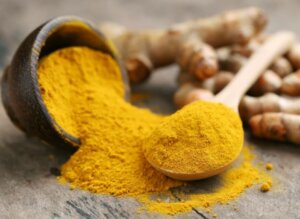The Importance of Diet for Treating Injury

When an athlete is injured, a proper diet is of utmost importance for their recovery. In these situations, it’s necessary to ensure that you’re getting the right nutrients. This helps maximize the reconstruction of tissues and speeds up the biological timeframe as much as possible. So what exactly is the importance of diet for treating injury?
Depending on the type of injury, there are different strategies that can be implemented. In the following article, we’ll review some of the most common pains and ways that we can adjust our diets to guarantee recovery.
Muscular injuries
When a muscular tissue in the body is injured, the first thing the body needs is to increase the speed of its reconstruction. The nutrient most responsible for this mission is protein.
Within the protein structure, the amino acid most implicated in reconstruction is leucine. That’s according to an article published by Nutrients magazine.
Because of this, in the recovery process of a muscular injury, the body has slightly elevated protein needs. There isn’t evidence supporting the idea that supplementing with BCAA or leucine can actually increase the speed of recovery, but they can help reduce acute pain in certain cases.
Reducing inflammation in these situations is key. For this, it’s essential to understand the importance of diet for injury and ingest enough omega-3 fatty acids. In addition, a few high doses of Vitamin C can help better the prognostic of muscular tears. This is thanks to Vitamin C’s ability to synthesize collagen.

However, its worth mentioning that during the period that the athlete is injured, it’s absolutely fundamental to adapt their diet to their energetic needs. In this way, they can ensure that there aren’t any undesired changes to their body composition.
Diet for tendon injury
The role nutrition plays in these types of injuries is controversial. On one side, there are experts that support the role that Vitamin C plays in the regeneration of collagen.
On the other hand, some articles support combining the consumption of this micronutrient with dosages of gelatin. In addition, the effects of certain supplements, such as shark cartilage, are disputed.
However, the latest trends seem to support that supplementing with collagen can reduce recovery times and prevent relapses.
In any case, the evidence of the importance of diet for injury and the impact of nutrition on the biological speed of these types of injuries is limited. A good readaptation process is crucial when you’re getting back into exercising. It aids in preventing relapses and strengthening the affected tissues.
Diet for joint injury
In these types of situations, the primary function of nutrition is to control inflammation. Ingesting anti-inflammatory nutrients such as Omega-3s and turmeric provides positive benefits for the management of these types of injuries.

Again, it becomes necessary to guarantee the proper intake of proteins in order to repair damaged tissues. In spite of this, it’s not necessary to supplement with protein, since your body needs less than when you’re actively training.
On the other hand, it’s important to reduce the consumption of trans fats, simple sugars, and processed foods. These substances can increase systemic inflammation in the body, which can be an obstacle to treating joint injuries.
The influence of foods on injuries
Despite the fact that an adequate diet can help to improve many processes of tissue regeneration, it shouldn’t be assumed that ingesting certain foods will have magical powers for an injury. Our biology has a certain timeline, which is usually slow, and modifying that is no simple task.
Optimizing certain aspects of the diet can increase recovery and, above all else, reduce the risk of relapse. However, that’s not to say that diet alone can shorten the length of time from when an injury occurs to when an athlete returns to competing.
It’s also worth mentioning that recovery is multifaceted. It needs to include proper pharmacological treatment with good nutrition and physical therapy sessions. Athletes need to readapt to physical exercise before returning to the usual routine.
Only through being intentional and precise in all of the previously mentioned realms can an athlete reduce their recovery times after being injured. It lowers the probability of them re-injuring themselves after returning to their usual routine.
Finally, it’s necessary to remember the importance of your body composition. You shouldn’t try to modify it during the period when you’re inactive. This means you’ll likely need to adjust your caloric intake, keeping in mind your body’s needs and the reduced caloric burn.
When an athlete is injured, a proper diet is of utmost importance for their recovery. In these situations, it’s necessary to ensure that you’re getting the right nutrients. This helps maximize the reconstruction of tissues and speeds up the biological timeframe as much as possible. So what exactly is the importance of diet for treating injury?
Depending on the type of injury, there are different strategies that can be implemented. In the following article, we’ll review some of the most common pains and ways that we can adjust our diets to guarantee recovery.
Muscular injuries
When a muscular tissue in the body is injured, the first thing the body needs is to increase the speed of its reconstruction. The nutrient most responsible for this mission is protein.
Within the protein structure, the amino acid most implicated in reconstruction is leucine. That’s according to an article published by Nutrients magazine.
Because of this, in the recovery process of a muscular injury, the body has slightly elevated protein needs. There isn’t evidence supporting the idea that supplementing with BCAA or leucine can actually increase the speed of recovery, but they can help reduce acute pain in certain cases.
Reducing inflammation in these situations is key. For this, it’s essential to understand the importance of diet for injury and ingest enough omega-3 fatty acids. In addition, a few high doses of Vitamin C can help better the prognostic of muscular tears. This is thanks to Vitamin C’s ability to synthesize collagen.

However, its worth mentioning that during the period that the athlete is injured, it’s absolutely fundamental to adapt their diet to their energetic needs. In this way, they can ensure that there aren’t any undesired changes to their body composition.
Diet for tendon injury
The role nutrition plays in these types of injuries is controversial. On one side, there are experts that support the role that Vitamin C plays in the regeneration of collagen.
On the other hand, some articles support combining the consumption of this micronutrient with dosages of gelatin. In addition, the effects of certain supplements, such as shark cartilage, are disputed.
However, the latest trends seem to support that supplementing with collagen can reduce recovery times and prevent relapses.
In any case, the evidence of the importance of diet for injury and the impact of nutrition on the biological speed of these types of injuries is limited. A good readaptation process is crucial when you’re getting back into exercising. It aids in preventing relapses and strengthening the affected tissues.
Diet for joint injury
In these types of situations, the primary function of nutrition is to control inflammation. Ingesting anti-inflammatory nutrients such as Omega-3s and turmeric provides positive benefits for the management of these types of injuries.

Again, it becomes necessary to guarantee the proper intake of proteins in order to repair damaged tissues. In spite of this, it’s not necessary to supplement with protein, since your body needs less than when you’re actively training.
On the other hand, it’s important to reduce the consumption of trans fats, simple sugars, and processed foods. These substances can increase systemic inflammation in the body, which can be an obstacle to treating joint injuries.
The influence of foods on injuries
Despite the fact that an adequate diet can help to improve many processes of tissue regeneration, it shouldn’t be assumed that ingesting certain foods will have magical powers for an injury. Our biology has a certain timeline, which is usually slow, and modifying that is no simple task.
Optimizing certain aspects of the diet can increase recovery and, above all else, reduce the risk of relapse. However, that’s not to say that diet alone can shorten the length of time from when an injury occurs to when an athlete returns to competing.
It’s also worth mentioning that recovery is multifaceted. It needs to include proper pharmacological treatment with good nutrition and physical therapy sessions. Athletes need to readapt to physical exercise before returning to the usual routine.
Only through being intentional and precise in all of the previously mentioned realms can an athlete reduce their recovery times after being injured. It lowers the probability of them re-injuring themselves after returning to their usual routine.
Finally, it’s necessary to remember the importance of your body composition. You shouldn’t try to modify it during the period when you’re inactive. This means you’ll likely need to adjust your caloric intake, keeping in mind your body’s needs and the reduced caloric burn.
All cited sources were thoroughly reviewed by our team to ensure their quality, reliability, currency, and validity. The bibliography of this article was considered reliable and of academic or scientific accuracy.
- Stokes T., Hector AJ., Morton RW., McGlory C., et al., Recent prespectives regarding the role of dietary protein for the promotion of muscle hypertrophy with resistance exercise training. Nutrients, 2018.
- DePhillipo NN., Aman ZS., Kennedy MI., Begley JP., et al., Efficacy of vitamin C supplmentation on collagen synthesis and oxidative stress after muscoloskeletal injuries: a systematic review. Orthop J Sports Med, 2018.
This text is provided for informational purposes only and does not replace consultation with a professional. If in doubt, consult your specialist.








